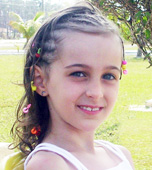Glutaric Aciduria, Type 1 (GA-1)
This story is shared by a family whose child has GA-I.

Not a day goes by when I look out the kitchen window and watch Nikki jumping on the trampoline, swinging, or riding her bike, that I do not think of how lucky we are. Nikki was born in June 1997 following a perfectly uneventful pregnancy and labor. She nursed right away and seemed perfectly normal.
When the midwife came to our house for the 24 hour visit, she asked if we wanted to have the expanded newborn screening test performed, and as we had with our first child, we agreed. After all, what was another 3 drops of blood and $25 (it was not covered by my insurance plan).
At the time, we had no idea what an impact that decision would have on our family! Thirteen days later, we were out shopping and came home to find a series of urgent messages on our answering machine from the midwife and the pediatrician. They told us our “perfect daughter” had a disorder called Glutaric Aciduria, Type 1. Though I am in the medical field, I just could not process the information they were giving me.
The next few hours were a blur, and before I knew it, I was driving Nikki to Lancaster General Hospital to meet a leading specialist in genetic disorders. The diagnosis was confirmed and Nikki was put on an IV that was supposed to satiate her. It did not and she screamed that entire first night. I had been breast feeding and was told I would need to stop, as from that day forward, we would need to track Nikki’s caloric and protein intake to prevent her from entering a fasting state, as it was the catabolized protein that seemed to be linked to seizures. She was also put on prophylactic Valium to prevent seizures.
For a mother who had never so much as given Tylenol, this was overwhelming. I questioned our specialist about the breast milk and he agreed that it was one of the best foods for infants as it is naturally high in calories and low in protein. I was given a breast pump that night, later purchasing a double pump, and for the next 17 months, Nikki drank only pumped breast milk from a bottle until I transitioned her to rice milk. She never had any formula.
We made charts, bought low protein cookbooks and followed a strict low protein, organic diet for 18 months. At 16 months of age, Nikki fell from a low rocking horse onto a padded, carpeted floor, and fell unconscious. I alerted her specialist, but had to have her admitted to our local trauma hospital, as we live 2 hours from Lancaster. They had never heard of GA-1 and did not know that subdural bleeds are one of the risks in these children due to the increased cerebrospinal fluid around the brain. It was intimated that this type of injury was usually found in abuse cases by the neurologist called in to see her. Several hours later, Nikki was getting worse instead of better and it became apparent they did not know how to handle her case. We were eventually transferred by helicopter to Lancaster General. I will never forget the overwhelming relief I felt when I saw our specialist waiting for us when we landed.
Nikki had another setback in the hospital when she appeared to have had a stroke. She awoke crying and I found that she could not use one side of her body and could no longer stand. Dr. Morton came right in and she had another MRI, confirming that her bleed had extended. Miraculously, with the phenomenal care from our specialist and the staff from the Clinic for Special Children and Lancaster General Hospital, she came through. Nikki walked out of that hospital.
Developmentally, Nikki hit every milestone when she was supposed to. She never had any formal therapy, but as a PT myself, I probably was giving her some developmental therapy without realizing it. She has flown through school with top marks and keeps up with her peers physically and mentally. Except for the continuing L-Carnitine and Calcium Pantothenate she takes daily in her juice, I treat her no differently than my other daughter. She is basically on a vegetarian diet, but does eat concentrated protein at least 3 times per week as Salmon Teriyaki, Chicken Marsala, and Shrimp Scampi are 3 of her favorite meals. She has never shown an
adverse effect to ingested protein as apparently some children do. I know Nikki’s story is so different from many of the children with GA-1, but I wanted to post this to give some hope to those of you who have recently received news that your little one has a lifelong illness.
Thanks for reading Nikki’s story.
Sincerely,
Carrie Hrichak,
written April 2005 by Nikki’s Mom, Carrie Hrichak


